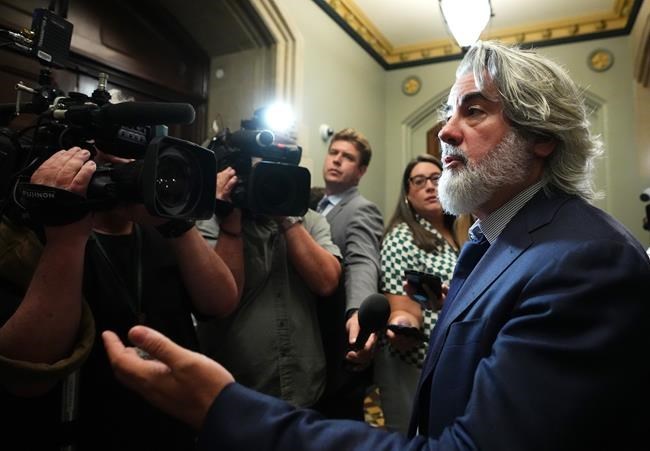OTTAWA — Canadian Heritage Minister Pablo Rodriguez said he remains hopeful digital giants will not make good on their threat to block access to Canadian news on their platforms, but if they do then the Liberal government will ensure newsrooms have the resources they need to continue their work.
"The world has changed and the same way we're adapting to platforms, well, the platforms also have to adopt to the new reality," Rodriguez said Tuesday in an interview.
The Liberal government's Online News Act became law last week, requiring tech companies such as Google and Meta to negotiate deals compensating media outlets for news content they share or otherwise repurpose on their platforms.
Rodriguez, facing tough opposition from Google and Meta, has stood firm in his view that the legislation, which was known in Parliament as Bill C-18, is needed to preserve newsrooms struggling to compete for online advertising dollars.
Meta said last week it would comply with the law by removing news from its Facebook and Instagram platforms before it takes effect by the end of this year.
Google said it came close to making the same choice as Bill C-18 came closer to passing, but an "11th-hour" meeting with Rodriguez resulted in the company delaying the decision. The company said it had "aggressively" pursued Rodriguez so that it could express its displeasure over the legislation.
Rodriguez disputed the characterization of the meeting as a last-ditch effort to co-operate. He said he usually meets stakeholders when a bill is introduced and again as it passes, and that his department met Google several times throughout.
He also said he remains firm in his view that Google will be subject to the law because of their market dominance in online advertising.
"They have a lot of questions, which is normal. And they want more certainty, they want more clarity, which from a business perspective is totally logical," Rodriguez said, adding that his conversation with Google was tough but constructive.
"Quite often that clarity comes at the end of the process, once the bill is adopted and you go into regulations."
Rodriguez would not say how his government would ensure newsrooms have resources beyond the existing suite of measures, which include funding programs for magazines, newspapers and local journalism, as well as tax credits.
But he said every option is on the table should Meta and Google block news.
"We have to make sure that newsrooms are open, that (journalists) are able to do their job and (they) have the resources necessary," he said.
The legislation for online news is one of two bills the Liberals passed this year that bring in new government oversight to digital giants.
The Online Streaming Act, which was known in Parliament as Bill C-11 before it became law in April, will force digital platforms such as Netflix, YouTube and TikTok to contribute to and promote Canadian content.
Rodriguez said tech giants and governments are not used to working together, but he predicts that C-18, already modelled after legislation that Australia passed in 2021, willusher in similar laws elsewhere around the world.
Rodriguez said a meeting of G7 heritage ministers he attended last year was mostly focused on Canada's work on both the online news and streaming acts.
A bill similar to C-18 is expected to soon become law in California, prompting similar threats from Meta that says it will block news in that state. But like Rodriguez, the California state legislature continues to call the company's bluff.
European Union regulators also recently hit Google with antitrust charges, saying the only way to satisfy competition concerns about its lucrative digital ad business is by selling off parts of the tech giant's main money-maker.
The EU followed a similar move by the U.S., which wants to bust Google's alleged monopoly on the online ad ecosystem.
Rodriguez said he has not had any conversations about Canada pursuing similar charges.
"I always try the positive or proactive approach: sit down and have constructive conversations," Rodriguez said.
Still, he perceives Google and Meta's online dominance as a growing threat to democracy, as newsrooms continue to shrink because of declining ad revenue.
Since 2008, nearly 500 newsrooms have closed across the country, and it's vital to Canada's democracy to keep the remaining ones open, Rodriguez said.
"I'm still hopeful that we can find a positive outcome for everyone," Rodriguez said.
This report by The Canadian Press was first published June 27, 2023.
— With files from The Associated Press
———
Meta funds a limited number of fellowships that support emerging journalists at The Canadian Press.
Mickey Djuric, The Canadian Press




